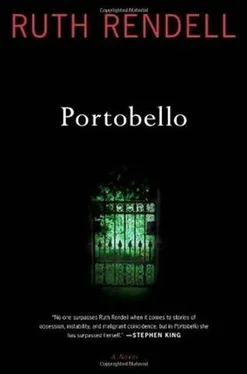Above his head he could hear Dorian Lupescu moving about. He hadn't yet encountered him and didn't want to. That top flat should have been his, not handed over to some immigrant or whatever he was. The man had moved in while he was in hospital and Lance was sure this had been arranged on purpose so that he wouldn't be there to tell Dorian about the inadequacies of his flat, complain about the missing table and give him an account of the sighting of the rat. Still, when he had accomplished a successful burglary he'd be able to move out and leave Uncle Gib and the Romanian (as that, apparently, was what he was) together on their own. He'd shake the dust of this place off his feet for ever.
The footsteps upstairs continued, followed by a swishing sound as if a mattress were being dragged about on a dusty wooden floor. Lance rolled over on to his front and went back to sleep.
Eugene had sold a picture by a painter who worked in the style of Max Ernst, just a small drawing called Dagon's Wife , which Ella found rather frightening, a woman with a cat's head in a silver dress and holding a fan made of bones, but he had got a large sum for it, his share of which, he said, would pay for their wedding. He was determined this must be lavish, her wedding dress not a bit like the one in the picture, but to be made by the designer who had made the Duchess of Cornwall's. Ella had got her own way only about the venue for the ceremony, not a church, not a register office, but a beautiful old house in Chiswick, licensed for marriages. The reception, which Eugene in his oldfashioned way called the 'wedding breakfast', though it would be a late lunch, was to be at the Connaught.
They had had a not very acrimonious argument about Ella's insisting on visiting this private patient of hers, Joel Roseman.
'I don't want to go over there, darling, you must know that. I've put him off twice and now I must go. He wants to tell me something.'
'Yes, I know. You said. But though you won't tell me what it's about you say it's not a physical illness he has. Isn't this a matter for a psychiatrist?'
'He's seeing a psychiatrist, Gene, but he doesn't like her. I think he'll give up. And you know I can't tell you things he tells me in confidence. Well, I don't think I can, though if they're not about an illness… I honestly don't know. It's just better not.'
With that Eugene had to be content. It wasn't that he was in the least jealous of Joel Roseman. Of Ella's love for himself he had no doubt. But at present he needed to be with her every moment of the time neither he nor she was working. She had seemed, he'd noticed, rather surprised, if gratified, by his new attentiveness and, apart from this insistence on dancing attendance on Joel Roseman, accepted it delightedly. Of course he loved her, there was no doubt of that, but the truth was that while they were together his consumption of Chocorange sweets was severely curtailed. He was obliged to pass hours without one. And this withdrawal from his fix, whole evenings of abstinence, a Saturday and Sunday in Rye and another in Gloucestershire, whole weekends, he hoped would help him in his phasing out. Unfortunately, what always happened was that as soon as he and Ella parted he was unable to resist gorging on the bloody things, one after another until half a pack was gone. It was in this way that he thought of them now, the classic addict's reaction, needing but hating, longing but loathing. The bloody things.
The sale of the quasi-Ernst, acknowledged decorously in the gallery with the purchaser and Dorinda in several glasses of champagne, he had personally and privately celebrated by dashing down to Elixir and tearing open a pack of Chocorange before he was even out of the store. Half the pack was eaten while he sat on a seat in Kensington Gardens and when he closed it and put it in his pocket he felt, for the first time, despair. In every respect his habit had become odious to him. He was a dignified man and no dependency could be more undignified than a craving for the sort of sweets guzzled by children and old ladies. It might also be seriously bad for him. Could you ingest vast daily quantities of a chemical sugar substitute without doing yourself enduring harm? The secrecy too appalled him. He knew he was naturally secretive but only to the extent of not wanting casual acquaintances and employees to know his private business. With regard to these wretched, horrible, bloody, lumps of caramel gunge, he had constructed a whole covert, hidden, humiliating world of pretence and lies, sneaking around pharmacies and stores to find his fix, inventing a serious disease for himself to cover an addiction as compelling and overpowering as if it had been heroin that enslaved him. And the phasing out wasn't a success. Or, rather, it was only when his life was calm and stress-free. Give him an hour or so with a client who couldn't make up his mind to buy or not to buy, give him a disagreement with the Customs and Excise or his accountants, and once it was past he was down the road to the nearest pharmacy…
Sitting there on a seat under a spreading copper beech, Eugene bent over and put his head in his hands, for once not caring who saw him or what they thought.
She rang the bell and banged on the brass knocker but it was a while before she could make Joel hear.
At last he came, trudging, bleary-eyed. 'I was asleep.' He peered at her as if he had never seen her before. 'I sleep a lot. I don't have much to do, so I sleep.'
It was brighter outside than the last time Ella had been to the flat but darker in here. 'The dim halls of sleep and death' was the phrase that came into her mind but she didn't know if this was a quotation or she had made it up. The darkness seemed to carry its own silence with it. She followed him into the living room where the blinds were down and this time no lamp was on. On the brown velvet sofa the cushions were crushed where his head had rested.
'I went to the hospital to have my check-up,' he said. 'The doctor said I should start taking gentle exercise. I said what was gentle exercise and he said walking. But I get very tired when I walk. Mithras tells me not to walk, to rest.'
'Have you told Dr Peacock about Mithras?' Speaking the name nearly made her shudder but she persisted. 'If you've started hearing his voice you ought to tell Dr Peacock.'
'I'm not going to Dr Peacock any more.' He sat down, waved her to a chair. 'I don't want someone like her. She doesn't tell me what to do. She doesn't tell me anything. I don't like the way she looks at her watch and tells me that's enough for today. It upsets me.'
'Joel,' she said, 'you must see someone. Your condition needs to be assessed and a suitable – well, a regime of drugs prescribed for you. I should think,' she added uncertainly. 'I can't do that. I'm not that sort of doctor.'
'But you're the doctor I want. You listen and you answer. You're not like Dr Peacock.'
'I shall refer you to someone else, Joel. I'll find someone you feel more comfortable with. Now you were going to tell me about your father. Could we have the blinds up, do you think?'
He shook his head. 'I like it better when it's dark.' He made a little sound, which might have been a sigh or only a rather strong expulsion of breath. 'I don't think I could talk about it in the light.' He looked at her and turned sharply away but it was a few seconds before he began to speak. 'Pa never spoke to me again, I told you that,' he said. 'My mother tried to get him to speak to me but he wouldn't. He sent me messages by her. I mean messages about money and school and going to university, that sort of thing. You know who he is, don't you? He's Morris Stemmer, you'll have heard of him.'
She had heard the name, she couldn't remember where. 'But you're called Roseman.'
Читать дальше











